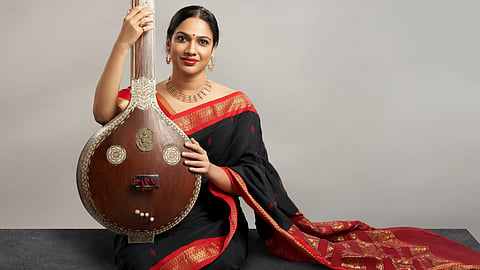
- LIFESTYLE
- FASHION
- FOOD
- ENTERTAINMENT
- EVENTS
- CULTURE
- VIDEOS
- WEB STORIES
- GALLERIES
- GADGETS
- CAR & BIKE
- SOCIETY
- TRAVEL
- NORTH EAST
- INDULGE CONNECT

If you follow Malayalam cinema, you would definitely have come across songs sung by this playback singer. She started her career with the song Deena Dayalo Rama for the film Arayannagalude Veedu. Since then, Gayatri Asokan, has sung 500 movie songs including Kadhayile Rajakumaranum from Kalyanaraman, Thumpi Kinnaram from Naran, Kinavile Janalakal from Pranchiyettan & the Saint and so many more! She is also a hindustani classical music singer, a bhajan singer and has performed hindustani concerts and programs based on film songs abroad. She recently released her latest ghazal titled Kitne Aish Se Rahte Honge and she let us in on everything you need to know about her upcoming single.
Tell us more about your latest single Kitne Aish Se Rahte Honge. What was the idea behind the song?
I wanted to work on ghazal written by Jaun Elia, who has quite a cult following in the Urdu literature landscape. In my previous albums, I have sung great poets like Ahmed Faraz, Faiz, Bashir Badr and so on. Jaun Elia was a very modern poet with dark and self mocking hues in his writing. I just wanted to tell a different musical story, hence this poetry. That is why we decided to give this beautiful ghazal our way of expression through raga Madhuvanti on which the ghazal is roughly based. Madhuvanti is a very haunting raga and I felt the lyrics would fit nicely into this raga.
Tell us about your collaboration with Alap Desai for this song?
This is the third single in which Alap Desai and myself have collaborated; the previous two ghazals Rakhunga Zindagi Par and Ab Kya Karenge were written by a contemporary poet Raza Bhopali. Since Alap is a very accomplished singer, he understands the genre of ghazals very well. I wanted ghazals enriched with classical ragas, hence, I enjoy working with him because it paves way for a lot of interesting improvisations on live stage where I perform these ghazals.
You mentioned that the production has been kept minimal so that the sarangi gets a proper space. Tell us about the importance of that?
Sarangi is a very earthy and gorgeous Indian instrument, which suits the mood and poignant expression of ghazals because of its unique and rich tonality. Momin Khan Niazi, who is a young and brilliant sarangi player was the right choice to be featured on this ghazal.
How would you say that this ghazal is different from the ones you have released before?
This ghazal is just another expression of the story of my musical journey. I haven’t aimed it to be different. My attempt is only an honest and straight from the heart rendition to the best possible way. I am privileged to be a ghazal singer. Ghazals for me are one of the best musical genres out there in terms of harmonic complexity, raagdaari, (expression of Indian classical ragas) and superior poetry.
Ghazals have been an integral part of Kerala culture. So, for you, was it a conscious decision to sing ghazals?
Ghazals have surprisingly a big fan following in Kerala, despite the fact that malayalis do not speak Urdu. Speaking for myself when I was a kid, I used to hear a lot of ghazals, not because I understood the language, but because I was attracted to the beautiful melodies. As I later got my training in hindustani classical music, I gradually navigated into concentrating on ghazals. But my main stay in Kerala for 20 years has been Malayalam playback where I had the opportunity of working with great composers like Ilaiyaraaja. After moving to Mumbai in 2017, I got the opportunity to pursue ghazals on national platforms.
What’s next for you?
My next release is also a ghazal, which is composed by me. Also there is another ghazal which has been composed by my husband, sitar maestro Purbayan Chatterjee. I hope to release it in February.
Kitne Aish Se Rahte Honge is streaming on all audio platforms.
Email: alwin@newindianexpress.com
X: @al_ben_so